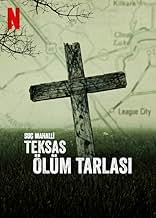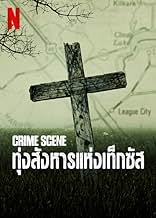An overgrown field and a stretch of highway connect a series of grisly murders spanning several decades as grieving families search for answers.An overgrown field and a stretch of highway connect a series of grisly murders spanning several decades as grieving families search for answers.An overgrown field and a stretch of highway connect a series of grisly murders spanning several decades as grieving families search for answers.
Browse episodes
Storyline
Featured review
In the end, they throw a name out that I don't even remember hearing in the first two episodes, and then they wrap up the whole series. But prior to that they keep bouncing around between this name and that name, reshowing the same pictures and very very slowly building up to some of the actual facts in the case. When I got to the end I felt like I had been punked. There's not really enough data to make a determination, as a member of the audience. But I do think for the police or FBI there is definitely enough information to make a determination. Another review claims that this was a missed opportunity to spotlight the shoddy police work. Well I kind of disagree because I believe that it was blaringly obvious, but I also disagree that this is about them. I remember the 70s as a teenager the '80s and '90s were times when we were taught about not getting into strangers cars not getting out of our car if we have a flat tire, not hitchhiking alone and things like that. Believe it or not we didn't have the elaborate bus systems that we have now in large and small cities, we had to hitchhike or find a ride or walk. I believe, in that sense, the producers here have assumed that all or most of the audience watching is familiar with the way in which some serial killers will disable a potential victims car and then show up to help them. That's the kind of thing they didn't need to say out loud. What bothers me most about this series is that - now trust me I'm bad with math - but they said 35 murders took place in those fields, and yet they only focused on four of them. Why? I appreciate the real life people that have kept these girls deaths in their hearts and tried to help their families, I hope that Tim Miller actually sees some of that money he won. But what about the other 31 girls? I mean if they're going to mention it why not tell us more. I guess I'll have to look online to find out if Reese - who I've never heard of through the whole series until the last 5 minutes - is the one responsible. And early on in the film they tell us that whoever did the murders in the seventies couldn't have been Clyde because he was in prison but then they try to blame him for all of them because he apparently did kill one. And in my mind that's the problem : there is a serial killer and then there is this one guy who is a killer and a pedophile but not necessarily a serial killer. And God bless his heart but have they completely ruled out Adam? Did they check his property before it was sold after his death? I mean being bullied has been a reason for people to take their lives, just ask any High School principal. And Psychopaths don't normally kill themselves unless they're about to go to prison. But after profiling him as a suspect when was he cleared by the fbi? And with such shoddy police work, are we sure that it was either a suicide or an accident? So I feel like this series is really more of a piece of cheese that never leads you to anything. I'm not sure what it's intent is because while I appreciate the four victims it is focused on why did it bring all this other information in and then just leave it dangling in the air like a faulty internet connection? I think what Netflix accomplished here is getting these victims back into the public's eye, or into the public's eye for the first time perhaps, and spotlighting the people who have devoted their time and resources to pursuing leads and helping others. Overall not a big waste of time but for me solid five stars.
Details
- Runtime50 minutes
- Color
Contribute to this page
Suggest an edit or add missing content


















